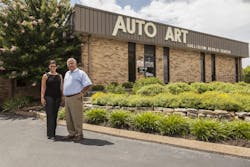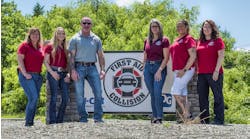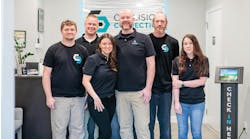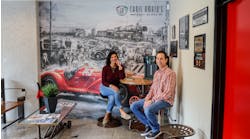The lights dim, the PowerPoint presentation flips on, and your attention is on Twila Harris and Danny Wallace.
In this scenario, you own a dealership. You don’t have a body shop, but Harris and Wallace do—seven of them, in fact, spread strategically within and surrounding Nashville, Tenn. And they’re here to pitch a partnership.
And based on their track record, they’ll probably win you over.
“Auto Art Body Shop: Quality Collision Repair Since 1970” glows in the background as they explain why they’re growing at such a rapid rate, how they can improve your operation, and why they’ve been a trusted name in Nashville for 46 years. It’s all to win your dealership’s business, which has been key for Auto Art expanding from four to seven locations since Harris joined as managing partner in 2013. Over the past three years, referrals and repairs from six dealer partnerships have accounted for 10 percent of Auto Art’s increase in revenue—which now stands at $19 million, and isn’t showing signs of slowing down.
Over the course of an hour, Harris and Wallace will offer several compelling reasons to partner with them: They’ll buy their OE parts exclusively from you; their focus on customer service runs deep throughout their organization (94 percent CSI scores across seven locations and 104 employees); and they offer fast, quality turnarounds on repairs (6.5-day cycle times for 875 vehicles repaired per month).
But, most importantly to Joel Trail—one of the very people Harris and Wallace sold their business on—they offer real solutions to very real problems.
“Our biggest problems from a dealership standpoint,” says Trail, service and parts manager for Gary Force Acura in Brentwood, Tenn., “are not having enough manpower to move back and forth between body shops, and getting it in and out on a very timely basis. Auto Art has been able to do that for me.”
The Next Level
Before the presentation starts, you’re handed a six-page black-and-red booklet brandished with “Auto Art Body Shop.” You flip to the first page and find the story of Wallace’s father, Bill, who opened the first Auto Art facility in Murfreesboro, Tenn., in 1970.
Back then, Bill was dedicated to the people, to the repairs. There were no ambitions of expanding into the metropolitan market—which didn’t coincide with Wallace’s vision of spreading the company’s reach.
“My dad started this business with an insurance partner, and it was built on customer service, it was built on quality repairs, and it was built on being fair,” says Wallace, who took over Auto Art in 1999. “We were poised for that next level.”
Auto Art Body shop
Location: Seven locations surrounding Nashville, Tenn.
Annual Revenue: $19 million
Staff: 104
Average Monthly Car Count: 875
Utilizing his business degree from Middle Tennessee State University, Wallace expanded around Auto Art’s original location. Over 13 years, he would open three more shops in Murfreesboro, Smyrna and Franklin—inching close to Nashville, but never quite knowing where to break in.
“I didn’t understand the market,” he says. “I needed to get bigger because I was trying to grow my market share.”
Nurturing by Nature
Just recently at one of Auto Art’s seven locations, the computers crashed. Harris spent six hours on the phone trying to resolve the issue.
And she didn’t mind the experience one bit.
“Everybody I talked to was like, ‘I love Nashville. Everybody is so nice!’” she says. “I love living here. We’re nurturers by nature. We like to take care of people, which is probably why I’m in the body shop business. I want to help people.”
When Harris sells Auto Art’s quality service and dedication to customers and dealerships, she speaks with the same passion, devotion, fervor she uses when gushing over the city she’s lived in since also graduating from Middle Tennessee State in 1990. It’s a level of affection she’s attempted to infect all 104 of her employees with since joining Auto Art three years ago.
“They understand the expectations before they come to work here,” she says. “If you can’t put your daughter in that vehicle, then don’t put someone else’s daughter in there. That’s always been the idea we try to live by.”
Starting out as a receptionist at a dealership, Harris bounced through various fixed operations roles—from customer relations manager to estimator to body shop manager—all the way up to operations manager for two dealerships. Through the years, she studied the Nashville market and built relations with various customers, insurance representatives and dealer professionals. All of that enticed Wallace, with whom Harris sat on the Nashville I-CAR Committee.
“She understood the national market,” Wallace says. “It was much more competitive with bigger shops, the DRPs and the concierge services available in Nashville than where we were. They had a bigger skillset than we had.”
“It was such a good fit for both of us,” Harris says. “He had some really strong relationships in the outskirts of Nashville, and I had some really strong relationships in Nashville.”
A Dying Breed
Harris and Wallace didn’t schedule this meeting with your dealership by happenstance—they spent hours researching your region’s growth forecast to position themselves as the answer to a common dealer dilemma.
“The dealership body shop is a dying breed,” Harris says. “Any of the newer dealerships, they’re not in the body shop business, so they rely on their collision center partners.”
While The Romans Group LLC reports 38 percent of dealerships having a collision center in 2015 (the highest was 39 percent in 2014), the research firm states the vast 33 percent decline between 2006 and 2010 reflects a long-term downward trend that began in the late 1980s. And from day one, Harris pinpointed body-shop-less dealerships in regions poised for growth.
Just as market analysis helps sell their businesses to dealerships, it’s been key to Auto Art’s growth. Carrying over a strong relationship with PPG, Harris introduced Wallace to the paint company’s propensity reports, which track growth patterns, median income, average demographics and vehicle makeup in 5-mile, 10-mile, 20-mile radiuses. Those reports helped the collision network establish two more locations within Nashville and another just north in Mt. Juliet, which, according to propensity reports, is the fastest-growing area in middle Tennessee.
“In some of our markets, the median income is $55,000. Nissan is a huge player down there because they’ve got a huge manufacturing plant. You’re going to fix a lot of Altimas and Maximas,” Wallace says. “But if you’re in [Mt. Juliet], the median income is $90,000 and you’re going to get a bunch of Mercedes and European vehicles.”
One-Stop Source
Appealing to market interests is one thing—earning your complete trust with just one meeting is another pitch entirely.
As a seasoned fixed operations manager, Harris can appeal to the average dealership’s customer base, and how much risk there is sending customers to an independent body shop.
“It takes a while for them to trust you and feel confident, because that’s their customer first,” she says. “[The customer] bought their car there, they’re probably going to go back and buy another car there.”
That’s why, on top of preaching her company’s extensive philanthropy efforts and deeply ingrained customer service mentality, Harris offers a proposal:
“A lot of times we’ll start with, ‘Let us fix one of your cars. We’ll show you what we can do,’” she says. “And then we just build on that relationship. Slowly but surely they tend to start using us.”
In the end, what truly appeals to dealerships is the win-win proposal.
“We explain to them the benefit of having a one-stop source,” she says. “We have seven locations, so all seven of those locations will commit to buying our Kia parts from one Kia dealership, and in return, we want you to be comfortable referring work to us.”
Layers of Confidence
The true root of Auto Art’s 10 percent growth (almost $2 million of its $19 million revenue) came from building “layers of confidence,” Harris says. While dealers have gone on to recommend Auto Art to insurance companies and other non-competing dealerships, the customer referrals have truly amped up growth.
“Especially with the higher-line cars, the Lexus dealership and the Acura dealership, those customers really want the opinions of their dealership,” she says. “They trust the service managers, they trust their advisor. A lot of times, that may even be the first call before they call their insurance company.”
Harris and Wallace will continue to add those layers as they continue their expansion, eyeing fast-growing areas within and around Nashville. And they’ll do it one dealership at a time.
If you don’t take their word for it, consider Joel Trail’s perspective:
“What attracts me to any business that I deal with is the honesty and professionalism of the people,” he says. “It’s always there with them—from a tech all the way up to Danny, you’re always getting the same kind of treatment. That’s most important to me.”
Marketing to Dealerships
Check out the booklet Auto Art uses for selling dealerships on partnerships.
Better DRP Relationships
Twila Harris says Auto Art’s dealer partnerships go a long way in expanding its DRP relationships. “If the insurance company feel like there's a need in a particular area, then we rely on those relationships with our [dealer] partners,” she says. “We’ll pick up the phone and just start calling and saying, ‘Hey, we started a partnership in north Nashville. What kind of market share do you have? Do you see a need for a shop there?’
“We rely heavily on our insurance relationships to decide where our next acquisition may need to be. That’s been the strategy behind three new locations.”
In addition, Harris and Danny Wallace have essentially copied their presentation for potential dealer partners and use it for insurance meetings. And if the insurance company needs a second opinion on Auto Art’s quality, it can contact one of the company’s many dealer partners.
Hiring Right—Every Time
Twila Harris wants every employee to have the customer top-of-mind at all times. Here are her strategies for ensuring that:
1. Preach your principles. During job interviews, Harris is sure to gauge the applicant’s reaction to her business philosophy.
“If you can’t put your daughter in that vehicle, then don’t put someone else’s daughter in there,” she says. “That’s always been the idea we try to live behind.”
2. Hire seasoned employees. Putting a huge emphasis on training, loyalty and customer service, Harris prefers to seek out and hire seasoned veterans of the trade, even if it means paying more.
3. Hire who you know. Finally, Harris has ensured a tight-knit staff with a clear objective in mind by hiring employees she and her management have worked with in the past.
“I have 42 employees in my three stores and at least 35 of them have worked for me a member of my management team before,” she says. “They understand the expectations before they come to work here.”




